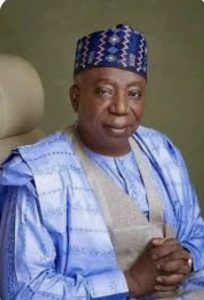Sen Aliero Lauds President Tinubu’s Budget allocations

A ranking Senator in the 10th Senate, Senator Adamu Aliero, representing Kebbi Central has praised President Tinubu’s decision to allocate significant funds to the agricultural sector, aiming to boost local food production and reduce Nigeria’s reliance on imported food.
This move is expected to have a positive impact on the country’s economy and food security.
The allocation to agriculture is a key part of this plan, and Senator Aliero’s endorsement suggests that the President’s efforts are gaining support from lawmakers by investing in agriculture.
The government hoped to empower small-holder farmers, increase food production, and ultimately reduce the country’s dependence on imported food.
Sen. Aliero described the budget as a “budget of consolidation,” acknowledging the government’s progress in areas like security, particularly with the defeat of Boko Haram.
The Lawmaker made this known in an interview shortly after President Bola Tinubu’s 2025 budget presentation on Wednesday.
Senator Aliero also commended the substantial allocation to the education sector, agreeing with President Tinubu’s emphasis on human resources development as essential for national progress.
Aliero however raised concerns about the budget’s allocation for debt servicing, which amounts to 15.8 trillion Naira and questioned the sustainability of such a large expenditure amidst Nigeria’s ongoing economic challenges.
“A significant portion of the budget has been allocated to defense, which Aliero viewed as a positive initiative.
The Lawmaker confirmed that the 2025 budget would follow a year-to-year cycle, from January to December, despite potential delays in its passage due to the ongoing 2024 budget extension.
“We will review it and debate it tomorrow. After the debate, it will be sent to the Appropriations Committee, which will later invite all the sub-committees of the Senate and the House of Representatives. They will invite ministers to present the budget for defense before it is eventually passed into law.
“Regarding education, he emphasized human resources. Human resources are the key to the future. No nation can afford to ignore the educational sector. If you want to grow and develop your country, you must prioritize education.
“Every developed country prioritized education, which is why they succeeded and progressed. You cannot excel or develop unless you have a well-focused educational system. A large portion of the budget is allocated to the educational sector, which I believe is appropriate.
“Truly speaking, if we go by what he said, it is a budget of consolidation. We are talking about security, and what we have achieved so far in this area is commendable.
“We have declared Boko Haram defeated, although we still have a significant number of bandits in the northwest and north-central regions.
“However, a large portion of the budget is devoted to defense, which falls under security. I think this is a very good initiative and a very good proposal.
“He also talked about agriculture. We need to improve our protection in this sector. A large part of the budget is dedicated to the procurement of agricultural inputs and machinery. This is a very good approach because Nigeria is an agricultural country.
“We must do everything we can to increase production. It is only when we produce enough food to feed ourselves and even export that we will be able to save our foreign exchange. We have no business importing food—I have said this repeatedly. All we need is support, and this support can only come from leadership.
We are going to use 15.8 trillion Naira to service debt. Do you think this is a good strategy, considering the widespread economic problems, hunger, and starvation in the country?
“No, I don’t think it is proper to allocate such a large sum of money to foreign debt service. However, if you listen to what he said, there is a significant improvement compared to the past.
“He has reduced the amount we use for debt servicing to about 48%, based on his statement. Although the figure may still seem large, it represents a significant reduction compared to previous levels.
“The only budget we now have in effect is the current 2024 budget, which has been extended until June 2025 to allow for the procurement and utilization of funds allocated in the 2024 budget.
“We don’t have much time left. With this budget being presented today, will the budget cycle follow a year-to-year format, from January to December?
Yes, of course, it is supposed to run from January to December. But since today is the 18th of December, it cannot be passed by the 31st of December. We will extend it into January. However, I can assure you that government activities will not be delayed because the 2024 budget has been extended until June. It will continue to be implemented, and by the time we return from the holiday, we will aim to pass it by January 31st or, at the latest, February” he ended.
